Tasks for Pancha Ganapati: Post about your 5 favourite books this year and why you appreciated them so much.
Tasks for Festivus: [...] --OR-- Perform the Airing of Grievances: name 5 books you’ve read this year that have disappointed you - tell us in tongue-lashing detail why and how they failed to live up to expectations.
I decided to create a joint post for my most and least favorite reads of the year -- and I'm going to have to divide the "favorite" part into "fiction" and "nonfiction." There is no way I could whittle the list down even further than these 10 books or treat some of them as "honorable mentions." That being said:
Favorite Books -- Fiction
... in reverse chronological order of reading:
Aravind Adiga: The White Tiger
 A searing portrait of modern India, writ large on a colorful, chaotic, topsy-turvy and utterly depraved and amoral canvas, but told with a great sense of humor belying the distinctly perceptible underlying sense of urgency.
A searing portrait of modern India, writ large on a colorful, chaotic, topsy-turvy and utterly depraved and amoral canvas, but told with a great sense of humor belying the distinctly perceptible underlying sense of urgency.
Audiobook splendidly narrated by Kerry Shale -- if ever someone deserved the title of "the man of 1000 voices," it's him.
Gabriel García Márquez: Crónica de una muerte anunciada
 The spine-chilling portrayal of an honor killing in a small Columbian seaside town and the events leading up to and following it, told in barely 100 pages and essentially in reverse chronological order, with the actual killing occurring on the last pages of the book: a brutal indictment of false morality, backwardness, cowardice and ineffectuality, both social and individual.
The spine-chilling portrayal of an honor killing in a small Columbian seaside town and the events leading up to and following it, told in barely 100 pages and essentially in reverse chronological order, with the actual killing occurring on the last pages of the book: a brutal indictment of false morality, backwardness, cowardice and ineffectuality, both social and individual.
Peter May: Coffin Road
 Ostensibly a stand-alone, but actually more of an extension of May's Lewis Trilogy, featuring some of the same characters but chiefly told from the point of view of an amnesiac scientist and an Edinburgh teenager in search of her missing (presumed dead) father. Starkly atmospheric and so gripping it made me overlook the fact that it contains not one but two elements I don't particularly care for: an amnesiac protagonist, and first person present tense narration of part of the story. (Note to Ms. Allingham -- see below, Traitor's Purse: This is how you convincingly write an amnesiac protagonist in search of his own identity while making sense of a murder that he may or may not have committed himself.)
Ostensibly a stand-alone, but actually more of an extension of May's Lewis Trilogy, featuring some of the same characters but chiefly told from the point of view of an amnesiac scientist and an Edinburgh teenager in search of her missing (presumed dead) father. Starkly atmospheric and so gripping it made me overlook the fact that it contains not one but two elements I don't particularly care for: an amnesiac protagonist, and first person present tense narration of part of the story. (Note to Ms. Allingham -- see below, Traitor's Purse: This is how you convincingly write an amnesiac protagonist in search of his own identity while making sense of a murder that he may or may not have committed himself.)
Shirley Jackson: We Have Always Lived in the Castle
 What can I say? It's Shirley Jackson -- nobody does psychological horror like her; slowly and meticulously building from a slight initial sense of unease to full-blown terror. I don't know how often I will actually revisit this book, but I do know that it, and the ladies in "the castle," will stay with me forever.
What can I say? It's Shirley Jackson -- nobody does psychological horror like her; slowly and meticulously building from a slight initial sense of unease to full-blown terror. I don't know how often I will actually revisit this book, but I do know that it, and the ladies in "the castle," will stay with me forever.
Also a great reading of the audio version by Bernadette Dunne.
Raymond Chandler: Farewell, My Lovely
 Not quite on the level of The Big Sleep, but what a pleasure to revisit Chandler's version of 1940s Los Angeles. His books are all essentially of a pattern, so I can't take too many of them back to back (or if so, it has to be in different formats; the way I revisited them for the Halloween bingo, with full cast audio adaptations mixed in), but it's hard to beat the gut-punch quality of his imagery and language, particularly when rendered as splendidly as in this audio narration by Elliott Gould.
Not quite on the level of The Big Sleep, but what a pleasure to revisit Chandler's version of 1940s Los Angeles. His books are all essentially of a pattern, so I can't take too many of them back to back (or if so, it has to be in different formats; the way I revisited them for the Halloween bingo, with full cast audio adaptations mixed in), but it's hard to beat the gut-punch quality of his imagery and language, particularly when rendered as splendidly as in this audio narration by Elliott Gould.
Favorite Books -- Nonfiction
... again in reverse chronological order of reading:
Martin Edwards: The Golden Age of Murder
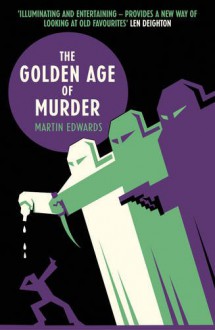 The early history of the Detection Club, told by its current president and first archivist. Martin's knowledge of both Golden Age detective fiction and the lives of its writers is downright encyclopedic, and he tells a multi-faceted story very compellingly. At times I had the feeling that he was taking his own conjecture a bit too far (I will, e.g., have to explore Anthony Berkeley's and E.M. Delafield's writing for myself before I wholly buy into his theory about their relationship, what they may have meant to each other, and how it is reflected in their novels), and there were things, chiefly relating to Agatha Christie and Dorothy L. Sayers, that I was already familiar with, but by and large, wow, what a read.
The early history of the Detection Club, told by its current president and first archivist. Martin's knowledge of both Golden Age detective fiction and the lives of its writers is downright encyclopedic, and he tells a multi-faceted story very compellingly. At times I had the feeling that he was taking his own conjecture a bit too far (I will, e.g., have to explore Anthony Berkeley's and E.M. Delafield's writing for myself before I wholly buy into his theory about their relationship, what they may have meant to each other, and how it is reflected in their novels), and there were things, chiefly relating to Agatha Christie and Dorothy L. Sayers, that I was already familiar with, but by and large, wow, what a read.
Not yet reviewed; status updates here:
Finished
210 of 528 pages
107 of 528 pages
67 of 528 pages
Jennifer Worth: Call the Midwife
 Yes, I know, I know, I'm late to the party and there's been a whole TV series at this point. And I'm sure the TV adaptation (which I've yet to watch) brings across the stories and the characters very nicely. But there's both an unflinching straightforwardness and a genuine warmth to the original literary version of these tales of midwifery in London's mid-20th century East End that I wager will be hard to replicate in any screen adaptation -- particularly if read with as much empathy, sense of humor and tasteful restraint as by the incomparable Stephanie Cole (who I would sorely wish would narrate many more audiobooks!).
Yes, I know, I know, I'm late to the party and there's been a whole TV series at this point. And I'm sure the TV adaptation (which I've yet to watch) brings across the stories and the characters very nicely. But there's both an unflinching straightforwardness and a genuine warmth to the original literary version of these tales of midwifery in London's mid-20th century East End that I wager will be hard to replicate in any screen adaptation -- particularly if read with as much empathy, sense of humor and tasteful restraint as by the incomparable Stephanie Cole (who I would sorely wish would narrate many more audiobooks!).
Review as yet to come.
Gregory Doran and Antony Sher: Woza Shakespeare -- Titus Andronicus in South Africa
 Man, what a trip. Titus Andronicus is not, and never will be my favorite play by William Shakespeare, but having read this book, I'd give anything to be able to watch a recording of this particular production. In the 1980s (when Apartheid was still in full swing) Gregory Doran (later: Artistic Director of the Royal Shakespeare Company) and Antony Sher decided to take this most violent and controversial of all the bard's plays to Sher's homeland, from which he had emigrated some 20 years earlier, wowing never to return (and even dramatically burning his passport). This book reproduces the salient parts of Doran's and Sher's diaries written during the project, from the moment the project was born to the play's actual run in Johannesburg and later, London and on tour. Insightful, illuminating, dramatic and, particularly in the moments of greatest tragedy and misfortune, surprisingly and supremely funny -- this is definitely one of those books that will stay with me forever (and not only because I happen to own it).
Man, what a trip. Titus Andronicus is not, and never will be my favorite play by William Shakespeare, but having read this book, I'd give anything to be able to watch a recording of this particular production. In the 1980s (when Apartheid was still in full swing) Gregory Doran (later: Artistic Director of the Royal Shakespeare Company) and Antony Sher decided to take this most violent and controversial of all the bard's plays to Sher's homeland, from which he had emigrated some 20 years earlier, wowing never to return (and even dramatically burning his passport). This book reproduces the salient parts of Doran's and Sher's diaries written during the project, from the moment the project was born to the play's actual run in Johannesburg and later, London and on tour. Insightful, illuminating, dramatic and, particularly in the moments of greatest tragedy and misfortune, surprisingly and supremely funny -- this is definitely one of those books that will stay with me forever (and not only because I happen to own it).
(And yes, one of these days I may even write a proper review of this book, too.)
Robin Whiteman & Rob Talbot: Brother Cadfael's Herb Garden / Robin Whiteman: The Cadfael Companion - The World of Brother Cadfael


Shared honors for two simply gorgeously illustrated coffee table books full of facts and knowledge about medieval monastery life (Benedictine and otherwise), the healing arts of the medieval monks, and the plants they used. Must-reads not only for fans of Ellis Peters's Brother Cadfael series but for anyone interested in the Middle Ages, monastic history, social history in general, botany, medicine, and pharmacy.
Review as yet to come, too.
Incidentally, a third book by this pair of authors -- Cadfael Country: Shropshire & the Welsh Borders -- provided, together with Ellis Peters's own Strongholds and Sanctuaries: The Borderland of England and Wales, important information and stimuli for the "Welsh borderland" part of my trip to Britain in late July 2017, and will certainly be consulted again should I make good on my plan to spend some time in Wales proper next year.
Jackie Bennett, with photographs by Andrew Lawson: Shakespeare's Gardens
 A lavishly illustrated coffee table book-sized guide to the gardens Shakespeare knew (or might have known) both in Stratford / Warwickshire and in London, as well as an introduction to the gardens of the five Shakespeare-related houses in and around Stratford, with an introductory chapter on Tudor gardening in general. The find of several great finds of my trip to [London, Oxford and] Stratford in mid-June of this year. (And it's even an autographed copy ... as I only discovered when I unpacked the book back home!)
A lavishly illustrated coffee table book-sized guide to the gardens Shakespeare knew (or might have known) both in Stratford / Warwickshire and in London, as well as an introduction to the gardens of the five Shakespeare-related houses in and around Stratford, with an introductory chapter on Tudor gardening in general. The find of several great finds of my trip to [London, Oxford and] Stratford in mid-June of this year. (And it's even an autographed copy ... as I only discovered when I unpacked the book back home!)
Least Favorite Books
... again in reverse chronological order of reading:
S.J. Parris: Heresy
 This started well, but went downhill fast literally within a page of the first murder having been committed. And I sincerely hope the real Giordano Bruno was not anything even remotely like the headless chicken that we're being presented with in this book in lieu of the incisively intelligent, street-smart -- indeed, supremely cunning -- philosopher-scientist and sometime spy that anybody who had spent even an hour reading about the real life Giordano Bruno would have expected.
This started well, but went downhill fast literally within a page of the first murder having been committed. And I sincerely hope the real Giordano Bruno was not anything even remotely like the headless chicken that we're being presented with in this book in lieu of the incisively intelligent, street-smart -- indeed, supremely cunning -- philosopher-scientist and sometime spy that anybody who had spent even an hour reading about the real life Giordano Bruno would have expected.
Utterly predictable and unengaging, never mind the author's obvious amount of research into 16th century Oxford academic life. Would she'd spent as much time thinking about her characters' personas and motivations ...
Margery Allingham: The Crime at Black Dudley / Traitor's Purse


Shared (dis-)honors for my two recent reads from Margery Allingham's Albert Campion mystery series. Both of the spy / international conspiracy variety that none of the Golden Age witers really excelled in, and Allingham's plots (and characters) tend to be among the most ridiculous of the lot -- as certainly exhibited here. Thank God her Campion series also contains some genuine jewels, such as Police at the Funeral, The Case of the Late Pig and, particularly, the downright devious Death of a Ghost. I hope my next exposures to Mr. Campion's adventures will be decidedly more in the latter line again.
Val McDermid: Forensics
 Possibly the disappointment of the year, even if I knew that McDermid's background is in journalism and crime writing, not in science. But she's associated with a forensics program at Dundee University and her crime novels manage to transport forensic detail with what has so far sounded to me as a reasonable degree of accuracy, so, given that I like her crime writing in other respects, too, my anticipations for this book ran fairly high. Alas, what I got was a frequently manipulative piece of investigative journalism and true crime writing, whose actual scientific contents was on the super-light side and entirely third-hand, with frequently not even a chance given to the reader to verify the precise source of a given statement or piece of information. I do hope Ms. McDermid will turn to crime fiction again in her next literary ventures ... her crime novels show just how much better than this she can really be.
Possibly the disappointment of the year, even if I knew that McDermid's background is in journalism and crime writing, not in science. But she's associated with a forensics program at Dundee University and her crime novels manage to transport forensic detail with what has so far sounded to me as a reasonable degree of accuracy, so, given that I like her crime writing in other respects, too, my anticipations for this book ran fairly high. Alas, what I got was a frequently manipulative piece of investigative journalism and true crime writing, whose actual scientific contents was on the super-light side and entirely third-hand, with frequently not even a chance given to the reader to verify the precise source of a given statement or piece of information. I do hope Ms. McDermid will turn to crime fiction again in her next literary ventures ... her crime novels show just how much better than this she can really be.
Simon Brett: An Amateur Corpse
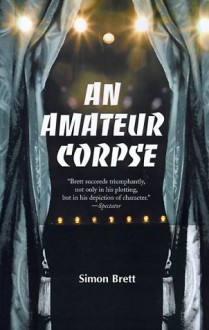
My first book by Simon Brett, and again, from a former president of the Detection Club I would have expected better. This novel wears its 1970s setting like a stifling cloak; it hasn't aged well at all and, what's worse, I didn't take to the protagonist at all, either (an actor in the throes of a midlife crisis); neither as far as his attitude towards women nor as far as his attitude towards amateur theatre productions was concerned -- in short, he struck me as a mysogynistic snob. I may give the series another chance at a later point, but it certainly won't be anytime soon.
Patrick O'Brian: The Final, Unfinished Voyage of Jack Aubrey
 I love O'Brian's Aubrey / Maturin series and raced through the whole 20 books at breakneck speed earlier this year, but by God, this particular publication (I won't even call it a "book", because it isn't) has to be one of the most blatant exercises in the exploitation of an author's literary legacy under the sun. Patrick O'Brian died when he wasn't even halfway into this story -- but instead of letting things rest, because this really is not anywhere near a completed novel, his publisher went and released the puny few initial chapters as a "book" in its own right.
I love O'Brian's Aubrey / Maturin series and raced through the whole 20 books at breakneck speed earlier this year, but by God, this particular publication (I won't even call it a "book", because it isn't) has to be one of the most blatant exercises in the exploitation of an author's literary legacy under the sun. Patrick O'Brian died when he wasn't even halfway into this story -- but instead of letting things rest, because this really is not anywhere near a completed novel, his publisher went and released the puny few initial chapters as a "book" in its own right.
My sincere advice to all newbie readers of the series: Spare yourselves the trouble of looking into this one; it's not worth it -- not for all the enjoyment of O'Brian's writing. Blue at the Mizzen, O'Brian's last completed Aubrey / Maturin novel, has a very satisfying conclusion -- content yourselves with that and just take it as read that "they lived happily ever after." Or, well, maybe not entirely happily as far as Stephen Maturin is concerned. But then, he probably wouldn't know what to do with himself if ever he were entirely happy; he's just not that kind of person. And Jack Aubrey couldn't possibly be any happier than he is at the end of Blue at the Mizzen.
Didn't review this and am not planning to.
Least Favorite Books - Honorable Mentions
Chris Bohjalian: The Sandcastle Girls
 Not an entirely bad book, but boy, this could have been so much more. Ostensibly, it deals with the Armenian genocide perpetrated by Turkey in the middle of WWI. What we really get is -- at least chiefly -- the love story of an American volunteer nurse trainee who has accompanied her father on a humanitarian mission to Syria and an Armenian refugee who, having concluded that his beloved wife is one of the 10,000s of victims of the death march through the Syrian desert to which the Turks exposed their Armenian women and children captives, falls head over heels in love with the aforementioned Western nurse trainee. Oh, sure, there are bits about the genocide as well (and Gallipoli, too, for good measure), but for many of these parts the reader isn't even right there with the characters but learns about them second-hand and in hindsight; and the ending is incredibly soppy -- and while it's obviously intended as a happy ending, a look beneath its shallow surface reveals that some characters' happiness comes at the greatest of all costs to another ... and at least one of those living happily ever after even knows about this, and nevertheless doesn't do anything about it (and if I hadn't stopped caring about that person long before I reached the end, that bit alone would have been the absolutely last straw for me.)
Not an entirely bad book, but boy, this could have been so much more. Ostensibly, it deals with the Armenian genocide perpetrated by Turkey in the middle of WWI. What we really get is -- at least chiefly -- the love story of an American volunteer nurse trainee who has accompanied her father on a humanitarian mission to Syria and an Armenian refugee who, having concluded that his beloved wife is one of the 10,000s of victims of the death march through the Syrian desert to which the Turks exposed their Armenian women and children captives, falls head over heels in love with the aforementioned Western nurse trainee. Oh, sure, there are bits about the genocide as well (and Gallipoli, too, for good measure), but for many of these parts the reader isn't even right there with the characters but learns about them second-hand and in hindsight; and the ending is incredibly soppy -- and while it's obviously intended as a happy ending, a look beneath its shallow surface reveals that some characters' happiness comes at the greatest of all costs to another ... and at least one of those living happily ever after even knows about this, and nevertheless doesn't do anything about it (and if I hadn't stopped caring about that person long before I reached the end, that bit alone would have been the absolutely last straw for me.)
Georgette Heyer: Death in the Stocks
 Georgette Heyer's books are hit and miss for me; this was definitely the most "miss" of the miss books to date. It's got a nicely-drawn atmospheric beginning, but that doesn't last for more than a few pages, and I didn't take to any of the characters; certainly not the "bright young things" and "good old chaps" at the center of the story -- nor even really Inspector Hanasyde, who is being introduced here. Also, the "who" in whodunnit has a likely candidate from early on, even though the "how" is a bit out of left field.
Georgette Heyer's books are hit and miss for me; this was definitely the most "miss" of the miss books to date. It's got a nicely-drawn atmospheric beginning, but that doesn't last for more than a few pages, and I didn't take to any of the characters; certainly not the "bright young things" and "good old chaps" at the center of the story -- nor even really Inspector Hanasyde, who is being introduced here. Also, the "who" in whodunnit has a likely candidate from early on, even though the "how" is a bit out of left field.
I'm not planning to read the entire Hanasyde series, just one or two more (those that have the most direct ties to the subsequent Inspector Hemingway books, which overall I prefer); and -- but for the odd stand-alone -- I think that'll conclude my foray into Heyer's crime writing.




 Log in with Facebook
Log in with Facebook 

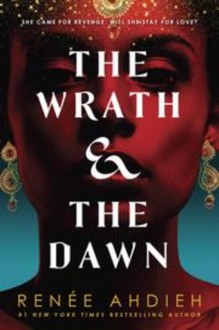
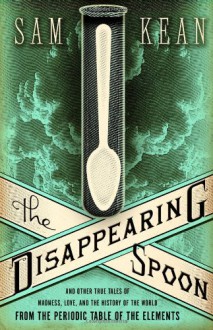
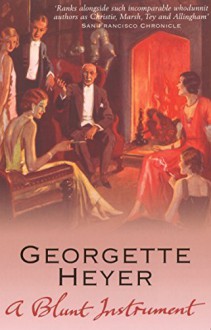






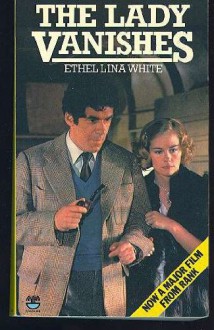















 This started well, but went downhill fast literally within a page of the first murder having been committed. And I sincerely hope the real Giordano Bruno was not anything even remotely like the headless chicken that we're being presented with in this book in lieu of the incisively intelligent, street-smart -- indeed, supremely cunning -- philosopher-scientist and sometime spy that anybody who had spent even an hour reading about the real life Giordano Bruno would have expected.
This started well, but went downhill fast literally within a page of the first murder having been committed. And I sincerely hope the real Giordano Bruno was not anything even remotely like the headless chicken that we're being presented with in this book in lieu of the incisively intelligent, street-smart -- indeed, supremely cunning -- philosopher-scientist and sometime spy that anybody who had spent even an hour reading about the real life Giordano Bruno would have expected.

 Possibly the disappointment of the year, even if I knew that McDermid's background is in journalism and crime writing, not in science. But she's associated with a forensics program at Dundee University and her crime novels manage to transport forensic detail with what has so far sounded to me as a reasonable degree of accuracy, so, given that I like her crime writing in other respects, too, my anticipations for this book ran fairly high. Alas, what I got was a frequently manipulative piece of investigative journalism and true crime writing, whose actual scientific contents was on the super-light side and entirely third-hand, with frequently not even a chance given to the reader to verify the precise source of a given statement or piece of information. I do hope Ms. McDermid will turn to crime fiction again in her next literary ventures ... her crime novels show just how much better than this she can really be.
Possibly the disappointment of the year, even if I knew that McDermid's background is in journalism and crime writing, not in science. But she's associated with a forensics program at Dundee University and her crime novels manage to transport forensic detail with what has so far sounded to me as a reasonable degree of accuracy, so, given that I like her crime writing in other respects, too, my anticipations for this book ran fairly high. Alas, what I got was a frequently manipulative piece of investigative journalism and true crime writing, whose actual scientific contents was on the super-light side and entirely third-hand, with frequently not even a chance given to the reader to verify the precise source of a given statement or piece of information. I do hope Ms. McDermid will turn to crime fiction again in her next literary ventures ... her crime novels show just how much better than this she can really be.
 I love O'Brian's Aubrey / Maturin series and raced through the whole 20 books at breakneck speed earlier this year, but by God, this particular publication (I won't even call it a "book", because it isn't) has to be one of the most blatant exercises in the exploitation of an author's literary legacy under the sun. Patrick O'Brian died when he wasn't even halfway into this story -- but instead of letting things rest, because this really is not anywhere near a completed novel, his publisher went and released the puny few initial chapters as a "book" in its own right.
I love O'Brian's Aubrey / Maturin series and raced through the whole 20 books at breakneck speed earlier this year, but by God, this particular publication (I won't even call it a "book", because it isn't) has to be one of the most blatant exercises in the exploitation of an author's literary legacy under the sun. Patrick O'Brian died when he wasn't even halfway into this story -- but instead of letting things rest, because this really is not anywhere near a completed novel, his publisher went and released the puny few initial chapters as a "book" in its own right. Not an entirely bad book, but boy, this could have been so much more. Ostensibly, it deals with the Armenian genocide perpetrated by Turkey in the middle of WWI. What we really get is -- at least chiefly -- the love story of an American volunteer nurse trainee who has accompanied her father on a humanitarian mission to Syria and an Armenian refugee who, having concluded that his beloved wife is one of the 10,000s of victims of the death march through the Syrian desert to which the Turks exposed their Armenian women and children captives, falls head over heels in love with the aforementioned Western nurse trainee. Oh, sure, there are bits about the genocide as well (and Gallipoli, too, for good measure), but for many of these parts the reader isn't even right there with the characters but learns about them second-hand and in hindsight; and the ending is incredibly soppy -- and while it's obviously intended as a happy ending, a look beneath its shallow surface reveals that some characters' happiness comes at the greatest of all costs to another ... and at least one of those living happily ever after even knows about this, and nevertheless doesn't do anything about it (and if I hadn't stopped caring about that person long before I reached the end, that bit alone would have been the absolutely last straw for me.)
Not an entirely bad book, but boy, this could have been so much more. Ostensibly, it deals with the Armenian genocide perpetrated by Turkey in the middle of WWI. What we really get is -- at least chiefly -- the love story of an American volunteer nurse trainee who has accompanied her father on a humanitarian mission to Syria and an Armenian refugee who, having concluded that his beloved wife is one of the 10,000s of victims of the death march through the Syrian desert to which the Turks exposed their Armenian women and children captives, falls head over heels in love with the aforementioned Western nurse trainee. Oh, sure, there are bits about the genocide as well (and Gallipoli, too, for good measure), but for many of these parts the reader isn't even right there with the characters but learns about them second-hand and in hindsight; and the ending is incredibly soppy -- and while it's obviously intended as a happy ending, a look beneath its shallow surface reveals that some characters' happiness comes at the greatest of all costs to another ... and at least one of those living happily ever after even knows about this, and nevertheless doesn't do anything about it (and if I hadn't stopped caring about that person long before I reached the end, that bit alone would have been the absolutely last straw for me.) Georgette Heyer's books are hit and miss for me; this was definitely the most "miss" of the miss books to date. It's got a nicely-drawn atmospheric beginning, but that doesn't last for more than a few pages, and I didn't take to any of the characters; certainly not the "bright young things" and "good old chaps" at the center of the story -- nor even really Inspector Hanasyde, who is being introduced here. Also, the "who" in whodunnit has a likely candidate from early on, even though the "how" is a bit out of left field.
Georgette Heyer's books are hit and miss for me; this was definitely the most "miss" of the miss books to date. It's got a nicely-drawn atmospheric beginning, but that doesn't last for more than a few pages, and I didn't take to any of the characters; certainly not the "bright young things" and "good old chaps" at the center of the story -- nor even really Inspector Hanasyde, who is being introduced here. Also, the "who" in whodunnit has a likely candidate from early on, even though the "how" is a bit out of left field.






